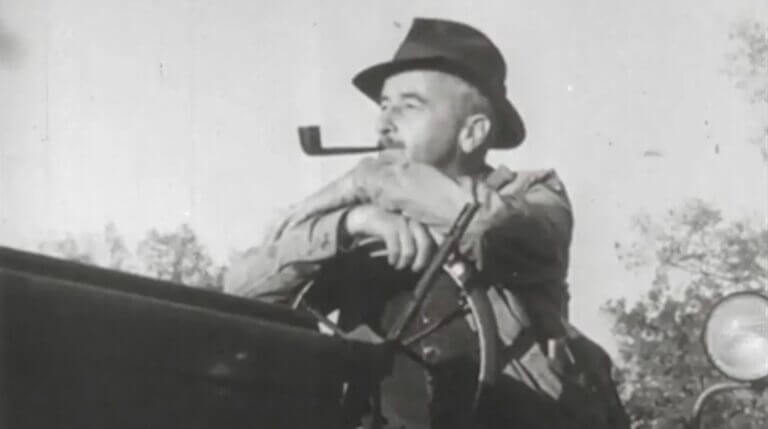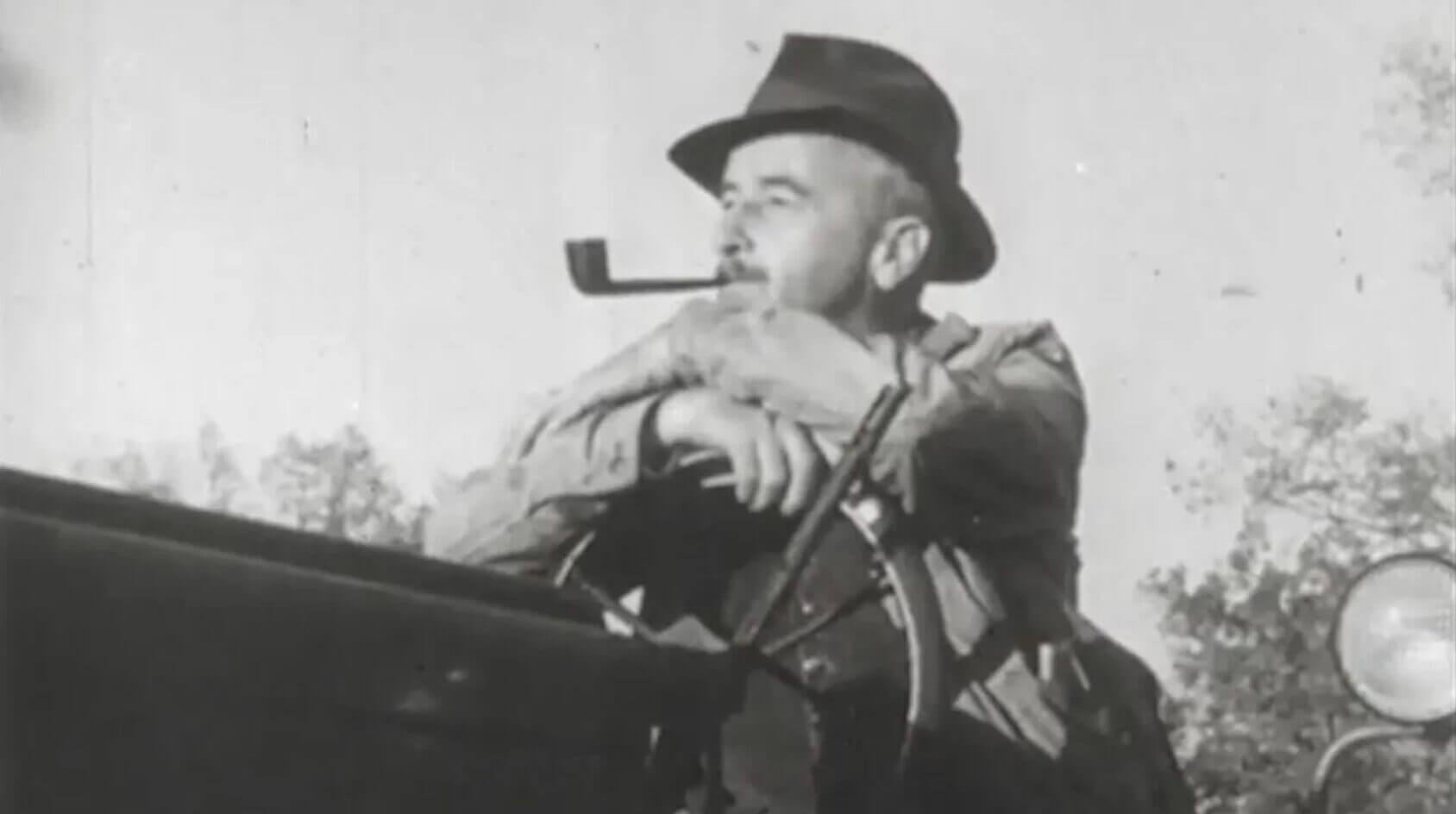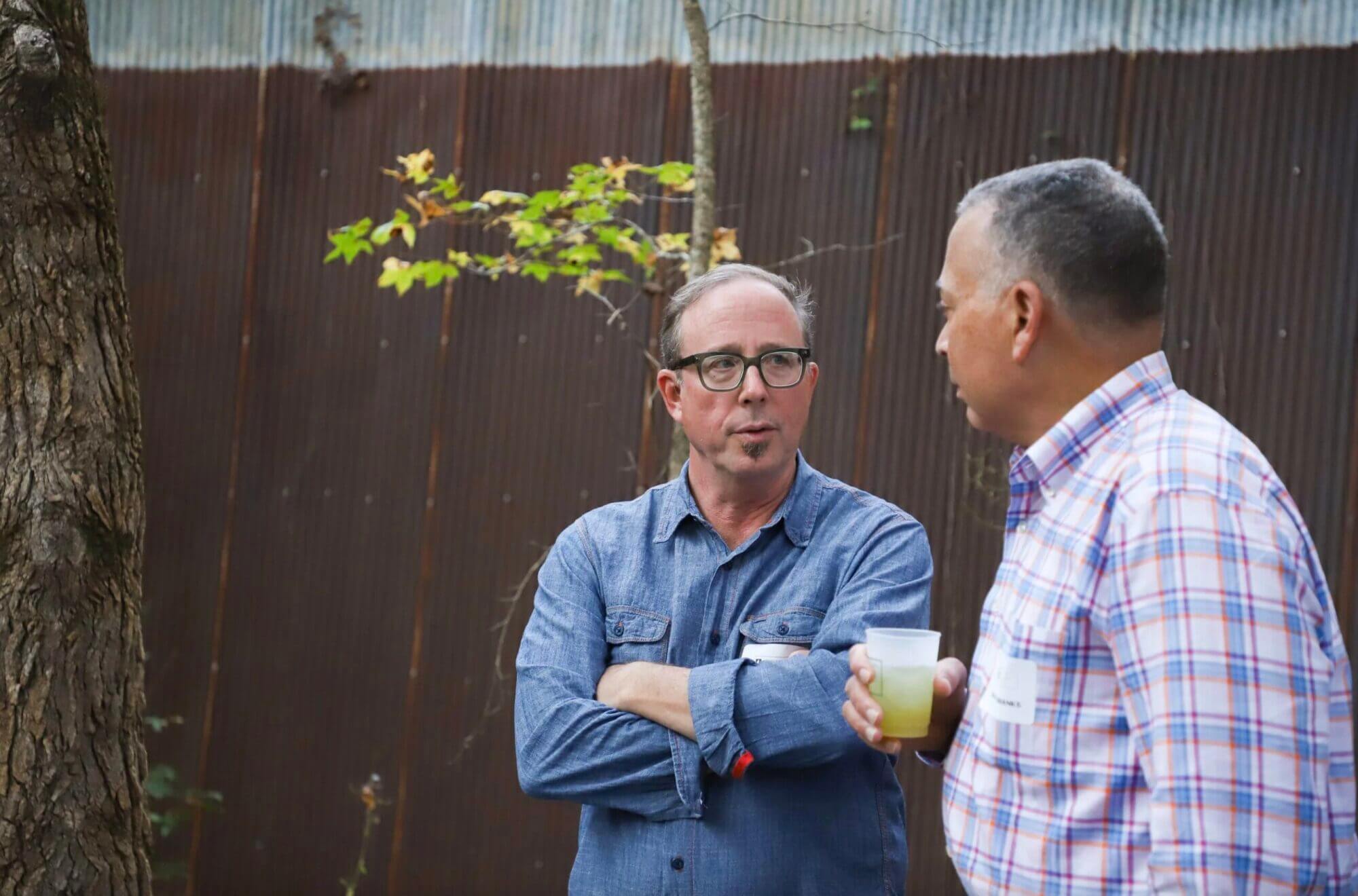

CORNERSVILLE — It was impossible not to wonder what William Faulkner might think of what was happening on his land on a drizzly, humid Sunday last fall.
Several of Mississippi’s up-and-coming artists drew, painted and photographed the depths of the landscape around us. A saxophonist and accordionist played some folk melodies, their riffs echoing off a rotting wooden house and a scattering of oak trees. Joe Stinchcomb, one of the South’s best bartenders, slung gin cocktails from a folding table for more than 100 people who’d trekked out in their mud boots and rain jackets.
We were deep in the woods for the Plein Air Invitational, an artist showcase hosted by the University of Mississippi at Greenfield, Faulkner’s old mule farm 17 miles east of Oxford toward his hometown New Albany. This ground, though much less visited than the literary icon’s home Rowan Oak in Oxford, is sacred to those who know it.
After he sold the movie rights for his novel “The Unvanquished” in 1938, Faulkner bought 362 acres here, where generations of Faulkners and tenant families such as the McJunkinses grew cotton and corn over the years. The fields, trees and trails tucked away in these hills served as literary inspiration for many stories people now obsess over. From 1938 to 1945, when Faulkner spent much of his time at Greenfield, he worked on “The Hamlet,” “Go Down, Moses,” and “A Fable.” In “Absalom, Absalom!”, Faulkner’s map of Yoknapatawpha County placed the fictional McCallum farm on the very site of Greenfield Farm. Puskus Creek, which flows east to west through the property, became the setting for the quicksand scene in the film adaptation of “Intruder in the Dust.”
After his passing in 1962 and the changing of owners over the years, the property fell into neglect. The farm failed and went into foreclosure around 1990, when a local bank sold 20 acres of the land to the University of Mississippi. For nearly three decades in the university’s possession, the property was largely unused, save for a few field trips of the annual Faulkner and Yoknapatawpha Conference. During this time, much of the history of the place was lost.
Sometime in 1992, Faulkner’s hunting cabin on the property burned. What remains of the farm’s structures are badly decomposing in the elements. There are no signs or markers signifying the place’s import, and there has been little reason to visit the land or even know it existed unless you knew someone who knew.
That’s all changing now. The 100 or so people who visited last fall had gathered for an art exhibition, yes. But their primary reason for coming out was not just to pay respect to the land’s importance and history, but to celebrate its future.
Attendees stood that day on the very site of what will become the Greenfield Farm Writers Residency, a retreat-style home for 40-50 writers per year. There will be a gathering lodge with offices, a library and a kitchen. Writers will have their own cabins to rest, write and focus. Overnight residents will receive a $1,000-per-week stipend.
So what would Faulkner, whose words have been parsed by generations of scholars and readers, think of all this?
“Later in his life, Faulkner advocated for solitary time and dwelled on the importance of writers having isolation and time to do their work,” said John T. Edge, the visionary and director of the Greenfield Farm Writers Residency. “We’re working intentionally to honor and build just that. A whole lot of people had planned for many years to responsibly leverage the Faulkner profile on this land to build something just like this.
“Mississippi is a state that depends on its writers, I would argue, more than any other to tell its story,” Edge continued. “So we’re going to offer Mississippians and anyone who feels some connection to Mississippi the place, the stipend, the time they need to plan, start, or finish their work.”

This project, for years just a vision and appealing concept drawn up on some fundraising material, just cleared its biggest benchmark yet.
In late August, the Institutions for Higher Learning board voted to approve the exterior design of the buildings on the property, a major step toward full approval of the construction process. Project leaders have raised $4.6 million for Greenfield Farm thus far, including a $750,000 legislative appropriation. Fundraising for additional capital costs and a separate $3 million endowment continues.
Multimillion dollar developments take time and plans often shift, but Edge said last week that project leaders hope to open the construction bid process this fall, they hope building will begin in the spring of 2026, and they hope to host a first cohort of residents in early 2027.
Several people have lent their expertise and perspectives to the project, but Edge is the leader of the endeavor. An accomplished author himself who is touring his new book ‘House of Smoke,’ Edge leads an initiative called The Mississippi Lab, a University of Mississippi-sponsored humanities laboratory for the state of Mississippi.
The idea for Greenfield Farm Writers Residency developed out of this initiative.
“I talk to a lot of writers. I claim a community of writers,” Edge said when asked about his drive for the development of Greenfield Farm. “We all ask each other, ‘Where’d you go to finish that book?’ or ‘How did you find time to write that draft?’ So many of them talk about the writers residences, trips to places like MacDowell in New Hampshire or Hedgebrook in Washington state. Beth Ann Fennelly just finished her new book ‘The Irish Goodbye’ at Loghaven just outside Knoxville. I finished my last book ‘The Potlikker Papers,’ the majority of it, at Rivendell near Sewanee. Writers of all sorts use these residencies.”
Edge is not doing this work alone. He’s leaned on a star-studded committee of advisors including Fennelly, Ralph Eubanks, Kiese Laymon, Aimee Nezhukumatathil, Ebony Lumumba, and Natasha Trethewey — renowned Mississippi writers who know exactly how residencies can bolster the creative process.
“A residency gives you time away from the day-to-day,” said Eubanks, a faculty fellow and writer-in-residence at the University of Mississippi Center for the Study of Southern Culture, who finished his upcoming book “When It’s Darkness on the Delta” at a residency in Cambridge. “I didn’t have to think about meals, my job, anything other than my writing. Most of us who are doing this type of work, we take slices out of our day to keep routine going. What a residency does is pulls you out of that routine and gives you a period of intense focus. We are in a culture where time and attention are very valuable things. To have a place where you can have the time and you can devote the attention to the work is invaluable.”
The Greenfield planning group is thinking deliberately about details large and small. How should the kitchen be designed, and what types of food will be served? How much sunlight will enter the writer’s cabins during the summer, and how much shade will the property offer during the winter after the oaks have shed their leaves? What type of bed is most comfortable for rest, and where in the cabins should the reading chairs go?

The logo design for the residency features a turkey buzzard, an ode to Faulkner’s 1958 quote: “… if I were reincarnated, I’d want to come back a buzzard. Nothing hates him or envies him or wants him or needs him. He is never bothered or in danger, and he can eat anything.”
One thing that will set Greenfield apart from other writers’ residencies is the stipend for overnight residents who are selected. Edge and the advisers focused considerable attention — and are still working hard to fundraise — to this idea.
“Traditionally, residencies have been the province of the upper and upper-middle class,” Edge said. “But writers of all economic strata need access to this kind of asset. How can we make it possible for people who may not earn a lot per year but they want to take a month off to start or finish a book? To do that, they’d be giving up a huge chunk of their income and their family could suffer. So we plan to level the playing field and put a stipend in their pockets. We want anyone, regardless of their economic status, to be able to take advantage of this asset.”
And, of course, a primary focus of the project planners is Mississippi. Edge, who says University of Mississippi leaders and particularly Provost Noel Wilkin have been immensely supportive of the project, said the university will have no say in the application process.
Evidence of this full-state focus is clear even before construction begins. The Plein Air Invitational last fall was cohosted with Jackson State University, and this fall’s artist invitational on October 19 will be cohosted with Mississippi State University. Donations for the project have come from the Julia Reed Charitable Trust in Greenville, the Gertrude C. Ford Foundation in Jackson, the Robert M. Hearin Support Foundation in Jackson and numerous donors across Mississippi.
“This will be a UM asset, but it is being built to serve the entire state,” Edge said. “This will be a place of production and a place to make new content for all of Mississippi. And we’re thinking about Mississippi in the broadest kind of way. If you were born here, you’re certainly welcome. But what about someone from, say, Chicago, whose Mississippi roots go back four or five generations? Absolutely. We will open our doors to anyone who feels some connection to the state.”
One doesn’t have to be a literary buff to know that Mississippi produces more than its fair share of impactful writers. But the writers we already know aren’t the full story here, Greenfield planners say.
“We are the seat of storytellers,” Eubanks said. “But my excitement about this is it will help us really enhance the work of the next generation of our state’s storytellers. There are so many stories across this state that are buried or truly hiding in plain sight. People who want to tell those stories might not yet have found the right path to tell them. This residency could be life-changing for them and for us all.”
- Former Greenwood police officer pleads guilty to federal drug trafficking charges - February 27, 2026
- UMMC officials say normal operations will resume Monday after cyberattack - February 27, 2026
- Hinds County public defender: Office needs additional funding to avert constitutional crisis - February 27, 2026